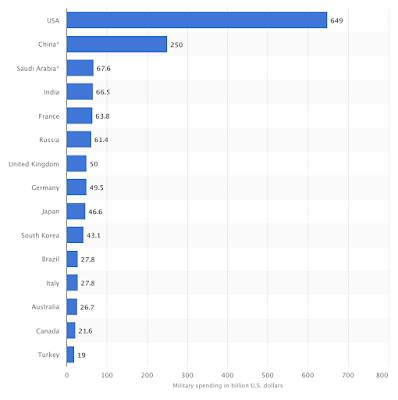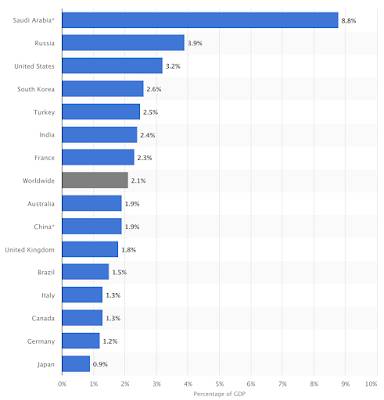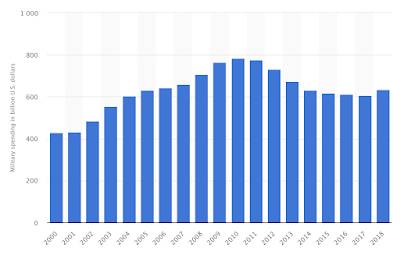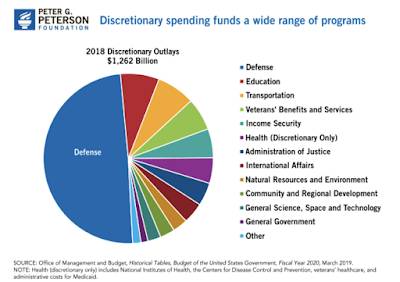
This article was last updated on April 16, 2022
Canada: ![]() Oye! Times readers Get FREE $30 to spend on Amazon, Walmart…
Oye! Times readers Get FREE $30 to spend on Amazon, Walmart…
USA: ![]() Oye! Times readers Get FREE $30 to spend on Amazon, Walmart…
Oye! Times readers Get FREE $30 to spend on Amazon, Walmart…
A recent interview in the Russian language newspaper Moskovsky Komsomolets with the Minister of Defense of the Russian Federation, Army General Sergei Shoigu, provides us with an interesting glimpse into the mindset of Russia's military and its attitude toward the world's most powerful (and expensive) military, that of the United States.
Let's open with this graphic which shows the nations with the highest military expenditures in 2018:
Here is a graphic showing the nations with the highest military expenditures as a percentage of GDP in 2018:
Here is a graphic showing how U.S. military spending has varied over the two decades from 2000 to 2018:
Here is a graphic from the Peter G. Peterson Foundation breaking down discretionary spending by Washington for fiscal 2018:
Note that spending on defense accounts for nearly half of all discretionary spending.
With that background, let's now look at the comments made by Russia's Minister of Defense, Sergei Shoigu.
The interviewer begins by asking the Minister if he was afraid of war. He responds that "…war is a terrible thing…" and that he is "…convinced that the country's security depends primarily on how strong its army is and how much it is able to defend its country. And also – from the confidence of citizens in their army…" and that, while he supports the fact that there is no war at this time, Russia's army "...must be very strong, well-armed and equipped and, most importantly, internally ready to defend its homeland…". He notes that Russia's army was in a "deplorable state" in 1999 and that Prime Minister Vladimir Putin began to make fundamental decisions on reforming Russia's military. Every year since 2013, Mr Putin meets with the leaders of Russia's armed forces in Sochi and is briefed on all aspects of military development and military security of Russia.
Here is a quote from the minister which outlines how the Russia military modernized and strengthened itself:
"Our key task was to synchronize all aspects of the preparation and construction of troops, including the training of professional personnel and the supply of modern weapons. We analyzed current and future threats, as well as the army’s capabilities to protect our country from them. We figured out the condition of the troops up to each military unit. And the result of this complex work was the development of a number of program documents, including a defense plan."
Russia's defense minister goes on to outline how Russia's military learned from its experiences during the war in Syria and how this practical fighting experience has impacted the nation's development of its military and its weaponry.
Here is a particularly pertinent question given the state of diplomatic relations between Washington, Moscow and Beijing:
"How likely do you think Russia's participation in any full-scale armed conflict in the near future? And in what strategic areas of Russia do you assess the greatest danger in the near future?"
Here is his answer:
"I hope that there is no question of a full-scale war today. And all the risks and consequences that such a full-scale war entails are obvious to everyone. Regarding the third world war, there are a very large number of different statements. The most accurate and adequate of them seems to me: “I do not know what kind of third world war will be. But I know for sure that she will be the last. " However, if we talk about the number of threats to our country, then they do not become less.
The United States has already withdrawn from two important nuclear arms control treaties. So far, the START-3 treaty remains, which is also under discussion in the USA: to renew it or not to renew it? As a result of this approach, the world is becoming more unpredictable and less secure. At today's level of informatization and automation, there is a high probability of errors in the weapons control system. That is why recently issues of ensuring information security have come to the fore. When you are aware of your vulnerability and are interested in maintaining balance and universal equal security, it makes you turn on your head.
And when you think how the United States continues to believe by inertia that a balance of power has developed in your favor, a variety of ideas may come to your head, including not the most reasonable ones. It is in this situation that I see now the main threat, and not only for Russia." (my bolds)
Here is his response when asked about the West's global intentions:
"…in the West, patterns and algorithms for overthrowing any legal authority inconvenient for them in any country have long been created. Of course, all this is done under the banner of promoting democracy. Well, in which country where they “came with democracy” did this democracy take root: in Iraq, Afghanistan or Libya? Or in the former Yugoslavia, which they forcibly divided into 6 countries with their "democratic" bombing in 1999…" (my bold)
Lastly, given the information that I provided at the beginning of this posting, here is the key question:
"The US military budget is ten times greater than the Russian one. Can Russia, in principle, effectively confront America under such conditions?"
Here is the minister's response:
"Our Supreme Commander-in-Chief answered this question thoroughly and reasonably. Not just it can – Russia is already quite effectively opposing America. Resists thanks to our science, our industry, our new developments. And besides this, we are not trying to compete with them on all fronts. If you put the US military budget on the shelves, understanding will come to you: they have huge expenses for various bases scattered all over the world. America has 170 such bases. The American costs of the same operation in Afghanistan alone are almost equal to our annual defense budget. Gigantic money is being spent by the United States on private military companies, on aircraft carrier groups. But does Russia really need its five to ten aircraft carrier groups, if we are not going to attack anyone? We need funds that could potentially be used against such enemy carrier groups in case of aggression against our country. And it is incomparably cheaper and more effective! I have given you only a few separate facts. But even proceeding from them, it is clear that we do not need to compare our defense budget with the American one. By the size of the defense budget, we are generally only in seventh place in the world. Saudi Arabia and, incidentally, Japan are ahead of us in this indicator. The main thing is that we are quite effective in our military expenditures, which are very precisely spent and are closely monitored by our Supreme Commander." (my bolds)
Russia's military and its leadership are clearly more interested in defending Russia than they are in projecting their power around the world. While Washington loves to point the finger at Russia for its alleged interference in the affairs of both Georgia and the Ukraine, Russia's Minster of Defense notes that the massive military budget of the United States is used to fuel disastrous conflicts around the world, all in the name of "bringing democracy" to nations like Iraq, Afghanistan and Libya where the United States has spearheaded nation rebuilding exercises.
Click HERE to read more from this author.
You can publish this article on your website as long as you provide a link back to this page.





Be the first to comment